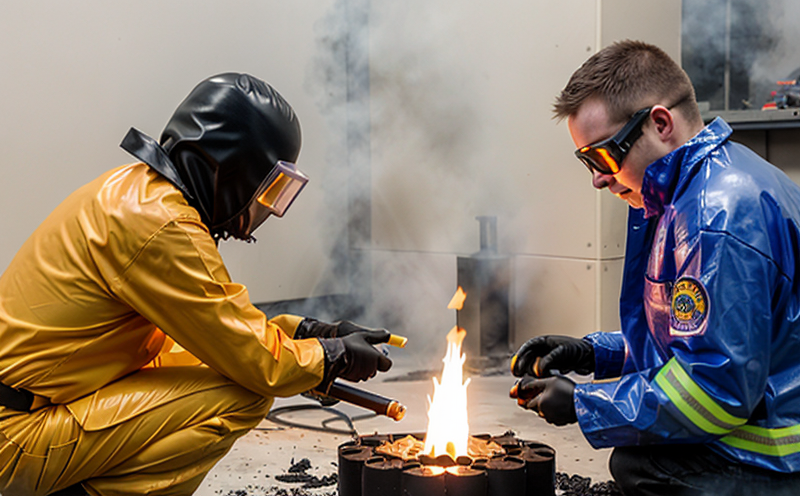Fire Safety Testing of Polymer Films
The fire safety testing of polymer films is a critical process that ensures materials used in various applications meet stringent standards for flame resistance, smoke density, and toxicity. This service is particularly important for industries where plastics, rubbers, and polymers are integral to the production of consumer goods, construction products, automotive components, and medical devices. The integrity of these materials can significantly influence fire safety outcomes, making this testing indispensable.
Polymer films can be exposed to a variety of environments that may involve high temperatures or open flames, such as those found in residential buildings, commercial spaces, vehicles, and industrial facilities. Ensuring these materials do not ignite easily, produce excessive smoke, or release toxic fumes is paramount for preventing the spread of fires and minimizing harm.
The fire safety testing process involves subjecting polymer films to controlled environments that simulate real-world fire conditions. This includes exposure to different types of flames (e.g., open flame, radiant heat), durations, and atmospheres. The goal is to assess how these films behave under such stressors, identifying potential weaknesses or areas for improvement.
Material properties such as melting point, thermal decomposition temperature, and chemical composition play crucial roles in determining the fire behavior of polymer films. Understanding these factors helps laboratories design tests that accurately reflect expected performance. For instance, high-temperature stability is essential for automotive films exposed to engine heat, while low-smoke emissions are critical for residential materials.
Testing methods include but are not limited to those specified by international standards such as ISO 13567, ASTM E648, and EN 962. These standards provide guidelines on specimen preparation, test procedures, and criteria used to evaluate flammability, heat release rates, and other key performance indicators.
Proper specimen preparation is vital for accurate testing results. This includes ensuring samples are cut to standard dimensions (e.g., 150 mm × 25 mm) with consistent thicknesses and edges free from defects that could affect test outcomes. Preparing specimens in this manner ensures comparability across tests, enhancing the reliability of the data generated.
Instrumentation used for fire safety testing includes specialized furnaces, gas flow meters, oxygen sensors, and calorimeters. These tools enable precise measurement and control over environmental conditions during testing, allowing accurate determination of material performance metrics.
The results from these tests are detailed in comprehensive reports that summarize test parameters, observed behaviors, and compliance with relevant standards. Reporting typically includes graphical representations such as heat release profiles or smoke density curves to visually depict fire behavior under various test conditions.
Accurate reporting is essential for stakeholders involved in product development, quality assurance, and regulatory compliance. It allows them to make informed decisions regarding material selection, process optimization, and safety improvements based on empirical evidence derived from rigorous testing procedures.
Benefits
- Enhanced Safety: Ensures that polymer films meet stringent flammability requirements, reducing the risk of fires in end-use applications.
- Better Product Design: Provides insights into material behavior under fire conditions, allowing for more informed design choices and improvements.
- Informed Regulatory Compliance: Helps manufacturers stay abreast of evolving regulations by ensuring products meet current safety standards.
- Improved Quality Assurance: Enables consistent quality control through standardized testing methods and reliable reporting practices.
Why Choose This Test
Selecting the right fire safety test for polymer films is crucial to ensure accurate assessment of their performance. By choosing our service, you benefit from expertise in conducting state-of-the-art tests using advanced instrumentation and methodologies aligned with international standards.
We offer a full suite of services tailored to your specific needs, whether it's basic flammability testing or more complex evaluations like smoke density measurements or heat release rate analyses. Our experienced technicians ensure that each test is conducted rigorously following best practices, providing you with reliable data on which to base decisions about material selection and product design.
Our commitment to accuracy and repeatability means we consistently produce high-quality reports that can be used confidently in various contexts—from internal quality assurance programs to external regulatory submissions. You can trust us to deliver results that meet or exceed industry expectations, helping you maintain a competitive edge in your market.
Competitive Advantage and Market Impact
Incorporating robust fire safety testing into your product development process offers several strategic advantages. Firstly, it enhances brand reputation by demonstrating a strong commitment to consumer safety. Secondly, compliance with stringent standards can open up new markets where higher safety expectations are prevalent.
By investing in comprehensive fire safety testing, you position yourself ahead of competitors who may not prioritize these aspects as thoroughly. This proactive approach fosters customer trust and loyalty while also enabling entry into international markets that have strict regulatory requirements regarding flammability and toxicity of materials used in consumer products.
The findings from our tests can drive innovation within your organization by highlighting areas where improvements are possible or necessary. For instance, identifying limitations in current material formulations could lead to the development of safer alternatives. Additionally, understanding how different environmental factors affect polymer films allows for more strategic decisions regarding production processes and supply chain management.
Achieving top-tier ratings on safety tests can elevate your company’s standing within industry peer groups, making it easier to attract investment or partnerships with other reputable organizations. Ultimately, this service contributes significantly towards maintaining a sustainable competitive advantage in today's increasingly stringent regulatory landscape.





